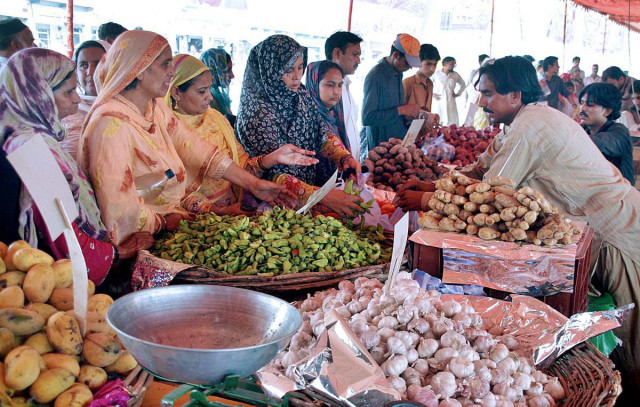Lahore:
Lahore residents continue to combat the benefit of essential foods, prices on the markets considerably exceeding the rate lists published by the government.
City consumers complain that traders seem free to charge everything they want during an already high inflation period.
The authority of the Punjab Application Act (PERA), which has been launched in order to modernize surveillance and introduce stricter checks, has not yet been effective.
For buyers who sail on the markets this week, the contrast between the rates checked and the real retail prices was clear.
Poultry has remained one of the most flagrant examples. The official price of live chicken was set between RS314 and RS328 per kilogram, while chicken meat was set at RS475. However, customers indicated that chicken meat was sold between RS510 and RS620 per kilogram, with bare cuts at RS900.
A buyer on the canton market expressed his frustration, saying: “Each time I see the official list of prices published on the wall, it looks like a joke. The merchants laugh when you point it. We have no other choice than to pay what they demand because we cannot stop eating.”
Vegetables have shown similar gaps. The potatoes, fixed at RS70 to RS75 per kilogram for grade A products, were constantly sold for RS120, while the mixed lower notes have passed for Rs80 to Rs100. The onions, officially listed at Rs75 to RS80, reached RS120 at retail. The tomatoes, which the government has set at RS136 to RS150, were sold for RS250 to Rs300, double the notified rate. Garlic and ginger were no exception. The local garlic, set at RS200 to RS210, was sold to RS300, while the Chinese and Thai ginger, officially at the price between RS430 and RS500, reached up to 800 rupees per kilogram. Other vegetables, including cucumbers, brinjal, spinach, zucchini and ladyfinger, have also ordered to take advantage of 30 to 70% above official prices, adding additional pressure on household budgets.
Fruit prices have highlighted the same problem. The apples, fixed between RS140 and RS325 depending on the variety, sold on the markets for RS200 to Rs500. The bananas, capped at Rs200 by dozen, cost RS250, while the guava, officially unchanged at Rs205 to Rs215, sold to Rs400. The dates, fixed at RS470 to RS510, were sold between RS800 and RS2,000 per kilogram depending on variety and quality. The grapes, peaches, papaya and kakis have also exceeded official price ceilings, with large differences in the neighborhoods.
Buyers say that when the authorities visit the markets, their inspections are at best symbolic and the sellers regain overcharges once the inspectors are leaving.
“The officials are delivered with notebooks and cameras, but the next hour, everything is the same,” said a Shadman resident who bought vegetables for his family. “We are told every week that surveillance will improve, but that never happens. Ordinary families like mine have no protection.”
Municipal administrators continue to take more strict controls, insisting that markets and market magistrates intensify surveillance. But with the short prices gaps in almost all perishable goods, the families of Lahore say that the burden of swollen invoices is developing every week.




